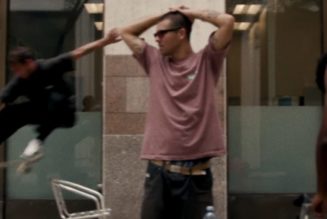The following profile was originally published on Tom Paxton’s 80th birthday. He turns 85 today (Oct. 31) and is currently on tour with the Don Juans—Don Henry and Jon Vezner. In July he released All New, a 28-song album recorded during the pandemic with Cathy Fink and Marcy Marxer.
It was a beautiful summer afternoon, with breezes blowing off the Hudson River, as Tom Paxton picked up his acoustic guitar under a bright tent at the Clearwater Festival in Croton Point Park, some 30-plus miles north of New York City.
For decades, Paxton has performed at this festival to support the environmental work of the Hudson River sloop Clearwater. The Clearwater was conceived in 1966 by Paxton’s longtime friend and mentor, the folk music icon and social activist Pete Seeger, who once called Paxton’s songs “part of America.”
Paxton, with a grey beard matching his hair, gazed across the Hudson to the wooded hills of the Palisades as he sang his opening song, with lyrics inspired by an Old Testament prophet and Seeger’s activism.
God knows the courage you possessed
And Isaiah said it best
How beautiful upon the mountain
Are the steps of those who walk in peace
Paxton — who turns 85 today — is one of the most important figures in American songwriting and the folk music tradition.
“You can draw a direct line from Woody Guthrie to Pete Seeger to this man, who is a true troubadour” said John Platt of WFUV (the adult-alternative public radio station at New York’s Fordham University) as he introduced Paxton at the Clearwater Festival.

The line of musical history from Paxton goes further. The folk music scene of Greenwich Village of the 1960s was the Big Bang of modern songwriting, a dramatic break from the styles that came before, which were rooted in musical theater. The impact of that era is still felt in the success of singer/songwriters today.
Bob Dylan “is usually cited as the founder of the New Song movement, and he certainly became its most visible standard-bearer, but the person who started the whole thing was Tom Paxton,” wrote the late folk pioneer Dave Van Ronk in his memoir The Mayor of MacDougal Street.
The Greenwich Village folk singers, early on, focused on traditional repertoire, songs with words and melodies passed down through generations and whose composers—Guthrie and Seeger aside—were typically unknown. Dylan changed that. However, “by the time Bobby came on the set, with at most two or three songs he had written, Tom was already singing at least 50 percent his own material,” wrote Van Ronk.
Across the decades, generations of musicians have drawn inspiration from Paxton’s songs of love, laughter and political outrage: “Ramblin’ Boy,” “Bottle of Wine,” “What Did You Learn In School Today,” “Whose Garden Was This,” “The Marvelous Toy” and countless more.
“The Last Thing On My Mind,” which Paxton released on his major-label debut album on Elektra Records in 1964, has since been recorded by Joan Baez, Johnny Cash, Glen Campbell, Neil Diamond, Gram Parsons, and Peter, Paul and Mary, among others.
In a career that spans more 60 albums, Paxton has received lifetime achievement recognition from ASCAP, the BBC and the Grammy Awards, as well as several Grammy Award nominations. But his greatest honor has been the praise of his peers.
“Tom Paxton taught a generation of traditional folk singers that it was noble to write your own songs, and, like a good guitar, he just gets better with age,” said the late Guy Clark, in one of the tributes collected on Paxton’s website.
Said Judy Collins: “He writes stirring songs of social protest and gentle songs of love, each woven together with his personal gift for language.”
“Tom Paxton embodies the spirit of folk music in the most beautiful sense,” said Ani DiFranco. “He’s the coolest.”
On stage at the Clearwater Festival, Paxton asked the crowd: “Can anyone honestly say that Pete and Toshi are not here today?” Pete Seeger passed away in 2014 at age 94, while Seeger’s wife, Toshi, died in 2013 at age 91.
Their spirits filled the festival, but Paxton himself almost skipped performing there.
“I came to a point a couple of years ago when I actually convinced myself that I was going to get off the road,” said Paxton in a recent interview from his home in Alexandria, Va., taking a morning break from doing The New York Times crossword puzzle to speak with Billboard. “At the same time I was starting to work with these two songwriters from Nashville, Jon Vezner and Don Henry.”
Vezner and Henry are best known for co-writing “Where’ve You Been,” recorded by Kathy Mattea, which received the Grammy Award for best country song in 1990.
“We were writing songs together,” recalled Paxton, “and they said, ‘we’ve started doing some performances, calling ourselves the Don Juans, and we’d love to open shows for you and then accompanying you.’ I said that sounds like fun. And, in fact, that’s what it’s been. I don’t love the travel, but I love the performing and the co-writing and the friendship.”
“I think I was playing ‘The Last Thing On My Mind’ when I was 14 or 15 years old,” says Steve Earle, who has shared the stage with Paxton and now lives in Greenwich Village. “Tom wasn’t the only person who got the idea you could write your own folk songs. But he wrote some of the best songs around, quite literally.”

Thomas Richard Paxton was born on Oct. 31, 1937 in Chicago and, when he was 10, the family moved to Arizona, where Paxton discovered the songs of Burl Ives, an early inspiration. (In his songbook and memoir, The Honor of Your Company, Paxton describes meeting Ives years later in New York and saying, “Burl, I just want to thank you for ruining my life. He laughed and showed not a trace of sympathy.”)
In 1948, Paxton’s family moved to Bristow, Okla. and he later attended the University of Oklahoma, to study drama. “I wanted to be an actor,” he told Bob Santelli, executive director of the Grammy Museum in a 2015 interview at the Woody Guthrie Center in Tulsa (where Paxton has donated his archive). “I have a degree in drama from O.U. But in the end,” he quipped, “I decided to settle for the security of folk music.”
In college, Paxton heard the album The Weavers at Carnegie Hall, from the group that featured Seeger, Lee Hays, Fred Hellerman and Ronnie Gilbert. Released by Vanguard Records in 1957, the album was a comeback for the foursome who had been blacklisted from radio and TV appearances during the McCarthy era for their progressive political beliefs.
“The breadth and depth of that album was so fantastic,” Paxton said at the Woody Guthrie Center. The variety of songs on the album—including love ballads, children’s songs, topical broadsides—anticipated the scope of Paxton’s own career. “By the time that album concluded, I had an epiphany,” he said. “I went from someone who loved this music to someone who had to do it.”
But first Paxton did a stint in the U.S. Army, which brought him from Oklahoma to the Northeast. He served at the Army Information School in New Rochelle, N.Y. and then at a clerk-typist school at the Army base in Fort Dix, N.J.—both within a bus or train ride from Greenwich Village. He began spending every weekend in the clubs of the emerging folk scene—the original Gerde’s Folk City on West 4th Street, One Sheridan Square and, on MacDougal Street, the Kettle of Fish and the Gaslight Cafe.
In their 2013 film Inside Llewyn Davis, directors Joel and Ethan Coen pay homage to the Village folk era. One character in the film, the earnest Troy Nelson, is based on Paxton and performs “The Last Thing On My Mind” in the movie. Paxton has only one quibble with the character: “I would have drunk paint from a can before I would have worn my [Army] uniform in the Village.
“I did like the movie a lot,” he said. “And I liked the look of the movie, it looked a great deal like it looked for us. The one thing that I noticed— about it was their movie not my movie—was that nobody laughed.
“And we laughed our asses off! I mean, we were having such a ball. We were having fun, making music and living it up. I’ve always loved to laugh. And I’ve always loved funny songs.”
But did Paxton and his peers in the Village in the ’60s also realize they were living through a remarkable period in history?
“No,” he replied flatly. “It was just the way it was. We were fish swimming in the sea; we didn’t know the sea. We had no clue that people would still be talking about it 50 years later, no idea of that.”
At that clerk-typist school in Fort Dix, Paxton, already a proficient typist, was bored silly. On his Army-issued typewriter, he pecked out the lyrics to what would become one of his most enduring children’s songs, “The Marvelous Toy.” Polished with the help of Noel “Paul” Stookey of Peter, Paul and Mary, the song also began one of the most significant professional and personal relationships of Paxton’s life, with the arranger, producer and music publisher Milt Okun.
Okun was auditioning a replacement for a member of The Chad Mitchell Trio, who had performed in 1960 with Harry Belafonte at Carnegie Hall. Paxton tried out for the gig (borrowing a guitar for the session from then-18-year-old Jim McGuinn, later known as Roger McGuinn, of the Byrds). Initially chosen, Paxton was told within a week that his voice wasn’t right for the group.
But he had played “The Marvelous Toy” for Okun. And Okun signed Paxton as the first songwriter to his new Cherry Lane Music publishing company—a relationship that continued for the next half century. Through Okun (who passed away in 2016) Paxton’s songs appeared on albums by Peter, Paul and Mary and John Denver, among many others. “The single biggest break I ever had in my whole career,” said Paxton, “was meeting Milt Okun.”

At the Clearwater Festival, Paxton recalled the evening in 1963 at the Village Gate on Bleecker Street when he asked Pete Seeger if he could play him a new tune. “Suuure!,” said Paxton, quoting Seeger and affectionately spoofing the folk icon’s boundless enthusiasm. He sang “Ramblin’ Boy” for Seeger—and recalled his astonishment when Seeger performed it soon afterward at Carnegie Hall.
But Seeger, having just learned the song, got the chorus wrong, singing “fare thee well, my ramblin’ boy,” not “here’s to you, my ramblin’ boy,” as Paxton wrote it. Afterward, from his travels, Seeger mailed Paxton a postcard decorated with one of his well-known banjo doodles. He wrote simply: “Dear Tom, Oops! Pete.”
Paxton was no political firebrand when he first came to New York (unlike, say, his friend and fellow songwriter Phil Ochs). “I was really quite apolitical, which is the way Oklahoma was in those days.” But the gathering storm of the Civil Rights movement of the 1960s shaped the songs and musicians of the era. Paxton recalls going to his first protest rally with songwriter Len Chandler at a Woolworth’s store in Manhattan. They declared solidarity with demonstrators engaging in “sit-ins” at a Woolworth’s lunch counter in Greensboro, N.C. seeking to end segregated service by the company. “I quickly began to develop a political consciousness,” he said.
From the start, Paxton’s topical songs were often laced with a mix of irony, insight and anger. The songs often transcend the time in which they were written. In “What Did You Learn In School Today,” from 1962, the “little boy of mine” tells his parent:
I learned that Washington never told a lie
I learned that soldiers seldom die
I learned that everybody’s free
That’s what the teacher said to me
What sets Paxton’s songs apart is a deep sense of empathy, conveyed by his writing in the first-person. “Jimmy Newman,” sung from the perspective of a young soldier in Vietnam, with its heart-breaking final verse, remains one of the most moving anti-war songs ever written. “The Hostage,” about New York State’s Attica prison uprising of 1971, is a harrowing lyric from the viewpoint of a murdered guard—who blames government authorities, not the prison’s inmates. And Paxton’s narrator in “The Bravest” is a survivor of the 9/11 attacks on the World Trade Center who’s “haunted by the sound/ of fireman pounding up the stairs / while we were running down.”
Paxton tells songwriting students: “If you want to know my approach to songwriting, pick up a newspaper, find an article or a cartoon or anything that moves you to any emotion at all, whether it be grief or rage or hilarity. Then write a song with yourself as either an eyewitness or a participant in that story.
“And the first thing that will do,” added Paxton, “is get you out of writing about your own boring life and your goddamn relationships. And it will put you out in the world—where Shakespeare wants you to be. The first-person is infinitely stronger in songwriting. And [the narrator] is almost never myself.”
You also can trace a good deal of American history through Paxton’s songs. On his most recent album, Boat In The Water, he re-recorded “Outward Bound” with its lyric of voyagers “upon a ship with tattered sail.”
“When Robert Kennedy was assassinated” in 1968, remembered Paxton, “I had call from CBS and I went in to their TV studios and they were recording literally all night in tribute. And the next day as the train was going down to Washington, D.C. carrying his coffin, they played that song, superimposed over images of the train. It took on that meaning for me; it still does.”
When asked to perform at Northwestern University in Evanston, Ill. for the first Earth Day in 1970, Paxton wrote one of the first great environmental protest songs, “Whose Garden Was This.” It still resonates in the age of climate change. “How I wish I didn’t feel I had to keep singing this song,” Paxton said at the Clearwater Festival. “But I do.”
Whose garden was this?
It must have been lovely
Did it have flowers?
I’ve seen pictures of flowers
And I’d love to have smelled one
Paxton remains as engaged as ever. During his Clearwater set, from his 2015 album Redemption Road, he performed a song—again written in the first person—condemning neglect of the impoverished. “If the poor don’t matter,” he sang, “neither do I.”
Since the election of Donald Trump—”this buffoon we have in the White House,” says Paxton—how has he reacted?
“I am outraged,” he said. “All the time. I’m working on one song that’s going to be difficult to pull off. It’ll be satirical. But it has to be savage—or there’s no point. I cannot express how dangerous I think this man is. And when he’s gone, Trump-ism will still be with us. I bleed for the country.”

For all the recognition he’s received for his topical repertoire, his storytelling tunes or his children’s songs, Paxton’s love ballads are among his greatest works. For his Clearwater Festival audience, as he introduced “My Lady’s A Wild Flying Dove,” he spoke of the inspiration for his love songs.
“Back in 1963,” he said, “the first week of January, into the Gaslight one evening, came the nearly 18-year-old Midge Cummings, on the arm of another folk singer—who had no chance. No chance. By the end of that evening, we were together. I proposed to her in two weeks. And if you ever saw a picture of her at that time, you’d say, ‘what took you so long?’
“We were married in six months,” said Paxton. “And in the end, we made it to just two months short of 51 years.”
Midge Paxton passed away in 2014 at age 69.
“Midge was… she was my guiding star,” Paxton said. “She was my conscience. She never lost sight of what I was trying to do. And if I seemed to be straying from it, she’d mention that. She was almost ready to listen to a new song. She’d point out speed bumps, if there were any.
“Above all, she was my cheerleader.”
At this birthday milestone, it seems the right time to ask: does Paxton ever reflect on the impact he’s had on decades of songwriters?
“No, I don’t,” he says. “I still find that kind of amazing. I don’t know why—when I think of the impact that Pete and Woody had on a generation of writers. I guess I shrink from putting myself in their company. To me, they’re the giants.”
What does he see as his own legacy?
“I hope people will see that I saw the richness in traditional folk music—it speaks to life, the best part of humanity—and I tried to perpetuate it in my own work. I just tried to add to that legacy.”
[flexi-common-toolbar] [flexi-form class=”flexi_form_style” title=”Submit to Flexi” name=”my_form” ajax=”true”][flexi-form-tag type=”post_title” class=”fl-input” title=”Title” value=”” required=”true”][flexi-form-tag type=”category” title=”Select category”][flexi-form-tag type=”tag” title=”Insert tag”][flexi-form-tag type=”article” class=”fl-textarea” title=”Description” ][flexi-form-tag type=”file” title=”Select file” required=”true”][flexi-form-tag type=”submit” name=”submit” value=”Submit Now”] [/flexi-form]











Tagged: entertainment blog, Folk, music, music blog, Music News, NEWS